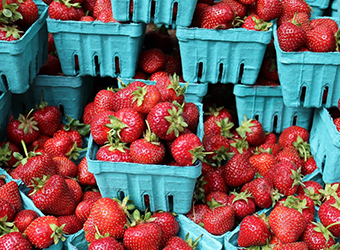A Saudi ban on the import of Egyptian strawberries went into effect on 18 January because inspections had showed that some shipments had contained pesticide residues that were higher than accepted, making them unsafe for human consumption.
The General Authority for Import and Export Control sent an official note to all listed exporters of agricultural crops informing them that the Saudi ban was in force.
The ban could have a negative impact on exports of strawberries this year, leading to losses for exporters, Helmi Eissa, a member of the Agricultural Export Council (AEC), told Al-Ahram Weekly.
The strawberry season starts in November and lasts until April. “This means that the season has been hit hard, and exporters will be obliged to redirect their produce and sell it at lower prices,” Eissa said.
Egyptian exports of strawberries to Saudi Arabia were estimated at 39,000 tons last year, valued at some $90 million.
In an attempt to prevent the application of the ban, a delegation from the ministries of agriculture and land reclamation as well as industry and foreign trade visited Saudi Arabia in November to discuss the issue, but Saudi officials decided nonetheless to impose the ban. “The Egyptian delegation suggested that the Saudi government would do better to ban imports from just the exporter or company that had violated the specifications rather than ban all strawberry imports,” said Hamed Abdel-Dayem, a spokesman for the Ministry of Agriculture and Land Reclamation.
“The Egyptian delegation suggested that the Saudi government would do better to ban imports from just the exporter or company that had violated the specifications rather than ban all strawberry imports,” said Hamed Abdel-Dayem, a spokesman for the Ministry of Agriculture and Land Reclamation.
Abdel-Dayem said the government was in constant contact with Saudi officials and the ban was expected to be lifted soon. The problem had arisen from the fact that new exporters had entered the market last year due to the great demand for Egyptian crops, and some of them were unaware of the rules and specifications, he said.
An official investigation is underway to discover which company did not abide by the regulations, leading to its removal from the list of exporters kept by the AEC. Two companies were removed in the past by the AEC when it was shown that their products did not meet specifications.
Excessive pesticide residues on Egyptian crops have been a problem that has hindered exports of agricultural goods over the past year to the United Arab Emirates, Bahrain and Kuwait. This is also not the first time that Saudi Arabia has banned Egyptian crops, since it imposed a ban on Egyptian strawberries in July 2017 and on peppers in January 2017.
The United Arab Emirates, Kuwait and Bahrain have banned Egyptian crops unless shipments have certificates from quarantine authorities that they are in accordance with EU specifications.
To avoid the recurrence of the problem and retain the good reputation of Egyptian exports in international markets, the ministries of agriculture and land reclamation and of industry and foreign trade issued a decree in May 2017 imposing a new system of exports control.
All agricultural shipments must be inspected by the Central Laboratory for Pesticide Residues and gain certificates showing that any pesticide residues follow international specifications as well as the importing country’s regulations.
Under the old system, this inspection was not obligatory but was conducted on an exporter’s request since it was not demanded by some importing countries.
Eissa said that shipments exported to European Union countries had had to be inspected, but often Arab countries had not requested this certification in the past.
The problem had come when the Arab countries started to apply the same specifications as the EU, he said.
In order to guarantee that exported crops do not contain pesticide residues, Abdel-Dayem said a new system had been put in place under which crops would be inspected several times while in the fields, after being harvested, and finally after being prepared for export.
Crop samples would be collected from the fields by officials to guarantee accuracy, he said.
Strawberry fields that do not export their harvest will need to be registered by the AEC in advance in order to arrange an official inspection. Smaller inspection lab units will also be established near large farms, and the first has been set up in Al-Salhiya Al-Gadida, a town in the Sharqiya governorate in the Delta.
The Saudi ban has had a positive effect, according to Eissa, since it has led to a new export-control system. “All the countries that import our products are satisfied with the new system and accept the Egyptian laboratory certificates. It may take some time, but Saudi Arabia will eventually accept the system as well,” Eissa added.
Since the flotation of the currency in November 2016 that cut its value in half, demand for Egyptian crops has increased abroad since they are more competitive in international markets. Egyptian agricultural exports increased to five million tons in 2017, compared to 4.5 million in 2016, Abdel-Dayem said.
Source: Ahram online
